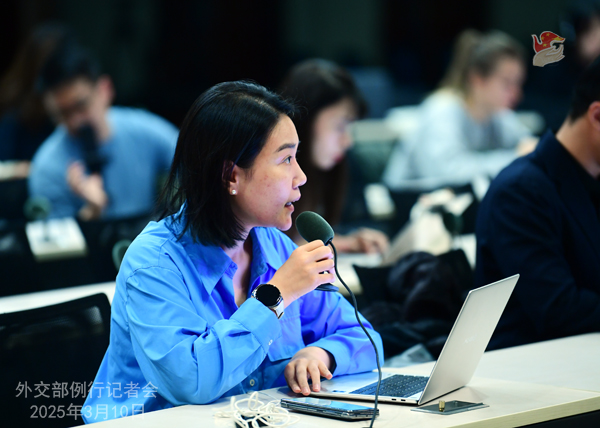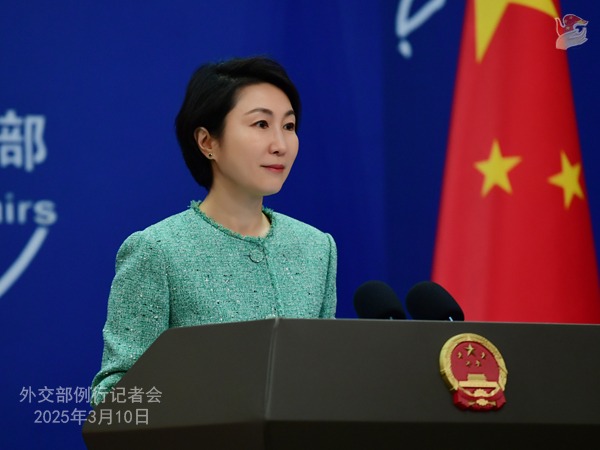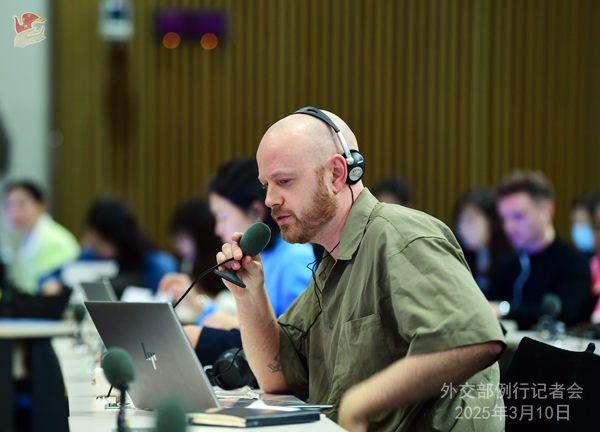
At the invitation of Member of the Political Bureau of the CPC Central Committee and Minister of Foreign Affairs Wang Yi, Minister of Foreign Affairs of the Lao PDR Thongsavanh Phomvihane will pay an official visit to China from March 12 to 15.
CCTV: We noted that when responding to a question about Taiwan at the press conference during the two sessions last week, Foreign Minister Wang Yi said that the only reference to the Taiwan region in the U.N. is “Taiwan, Province of China.” Some believe this statement shows the Chinese mainland’s tougher policy on Taiwan. What’s your view?
Mao Ning: Resolution 2758 adopted in 1971 by the U.N. General Assembly made it clear that there is but one China in the world, Taiwan is not a country, and Taiwan is part of China. It also made clear that there is only one seat of China in the United Nations, and the Government of the People’s Republic of China is the sole legal representative in the U.N. This resolution is observed by the U.N. and its specialized agencies as evidenced by their reference to Taiwan as “Taiwan, Province of China.” It was clearly stated in the official legal opinions of the Office of Legal Affairs of the U.N. Secretariat that “the United Nations considers ‘Taiwan’ as a province of China with no separate status.” This is the U.N.’s consistent position, which is well documented.
On the Taiwan question, China’s position is consistent and clear. We stay committed to the one-China principle and the 1992 Consensus. We stand ready to work with the greatest sincerity and exert utmost efforts to achieve peaceful reunification. Meanwhile, China will take all necessary measures to defend national sovereignty and territorial integrity, and firmly oppose “Taiwan independence” separatism and external interference.
China Daily: On the upcoming visit to China by Lao Foreign Minister Thongsavanh Phomvihane that you just announced, can you share the arrangement of the visit and China’s expectations? How does China view the current China-Laos relations?
Mao Ning: China and the Lao PDR are socialist comrades and brothers. The two countries have taken the lead in advancing the building of a community with a shared future and implementing the three global initiatives. Last year, General Secretary and President Xi Jinping had a successful meeting with General Secretary and President Thongloun Sisoulith during the BRICS Summit in Kazan, reaching new outcomes in the comprehensive strategic cooperation between the two countries. China has been the biggest source of foreign investment and destination of exports for the Lao PDR for many consecutive years. The China-Laos Railway has witnessed continued growth in both passenger and cargo volume, and its cross-border cargo transport has covered 19 countries and regions. The railway has become a golden route for transportation on the Indo-China Peninsula.
The upcoming visit is the first visit to China by Lao Foreign Minister Thongsavanh Phomvihane after he took office. He is also the first foreign minister to visit China after China’s two sessions this year. This demonstrates the great importance both sides attach to the bilateral relations. During the visit, Foreign Minister Wang Yi will hold talks with Foreign Minister Thongsavanh Phomvihane to exchange views on implementing the common understandings between the top leaders of the two parties and two countries and enhancing bilateral and multilateral strategic coordination. China hopes that the visit will help deepen and enrich the building of the China-Laos community with a shared future, deliver tangibly to the two peoples, and contribute to global and regional peace, stability and development.
Reuters: China imposed tariffs on some Canadian agricultural goods on Saturday. What does it say about the status of the China-Canada relationship?
Mao Ning: Relevant Chinese authorities have issued an announcement on this. In disregard of China’s repeated persuasion, Canada has insisted on taking discriminatory restrictive measures on some Chinese imports. This seriously violates WTO rules, disrupts normal trade order, and gravely harms China’s lawful rights and interests. The countermeasures China has taken are fully necessary, justified, reasonable and lawful. China urges Canada to take concrete steps to correct the wrongdoings, and provide a fair, non-discriminatory and predictable environment for the normal trade and cooperation between the businesses of the two countries.

Xinhua News Agency: According to reports, Egyptian Foreign Minister Badr Abdelatty said recently that the 20th Extraordinary Session of the OIC Council of Foreign Ministers adopted the plan for early recovery and reconstruction in Gaza which was proposed by Egypt and endorsed by the Arab League summit earlier. He also emphasized the importance of mobilizing international support. Foreign ministers of the U.K., France, Germany and Italy have issued a joint statement to support the Arab plan for reconstruction of Gaza, saying that the plan shows a realistic path to the reconstruction of Gaza. What’s China’s stance on this plan?
Mao Ning: Foreign Minister Wang Yi stressed last week when meeting the press during the two sessions that we support the plan for restoring peace in Gaza initiated by Egypt and other Arab countries, that is, the plan for early recovery and reconstruction.
On the question of Palestine, we’ve always supported the legitimate concerns and position of Arab and Islamic countries and held the view that the principle of “Palestinians governing Palestine” should be observed in post-conflict governance in Gaza and we need to ensure that the Palestinian people will rebuild their home on the territory of their own. In a long-term perspective, the ultimate settlement of the Palestinian question requires a return to the right track of the two-State solution. We will continue to work with the international community to play a constructive role to this end.
Global Times: U.S. Treasury Secretary Scott Bessent on multiple occasions stressed that the Chinese economy is over-dependent on export and that the U.S. wants fair and reciprocal trade ties. What’s China’s comment?
Mao Ning: You can find in this year’s Report on the Work of the Government that “stimulating domestic demand across the board” is listed as the first of the ten major tasks for this year. The report also stresses that China will vigorously expand domestic demand across the board and make it a key driver and stabilizing force for economic growth.
The China-U.S. trade, as it is now, is the result of market forces with multiple factors at play, including the two countries’ economic structures and trade policies as well as the position of the U.S. dollar. China never seeks a trade surplus. The fact is, the U.S. has benefited abundantly from trade with China. If you look at the breakdown of statistics, the exports of China-based U.S. companies are also counted as China’s trade surplus. The high-quality products at reduced cost exported by China to the U.S. have essentially raised the purchasing power of U.S. consumers, and created a huge amount of jobs in the U.S., particularly in sectors such as transport, wholesale, retail and e-commerce. By the way, the U.S. continues to run a huge surplus in trade in services.
China-U.S. trade and economic ties benefit both sides. If one had been ripping the other off, there is no way the ties would have come this far as we see today. To call the economic ties a “rip-off” and pursue absolute reciprocity in trade goes against the most basic economic common sense and those who do so are underestimating the judgement of U.S. companies and consumers. No matter what the purported rationale is, it cannot hide the U.S.’s aim of politicizing and weaponizing trade issues to contain and go after China. It’s been years and years since the U.S. initiated the trade war against the rest of the world, yet it has not stopped U.S. trade deficit from going up and reaching US$918.4 billion last year. Whether it’s a tariff war or a trade war, they invariably start by hurting others before coming back to hurt the one who launched it. It’s time for the U.S. to learn its lesson and end this wrong practice.
AFP: According to ROK’s Ministry of National Defence, the DPRK seems to have fired about a dozen missiles to waters west of the Korean Peninsula today. What is China’s response?
Mao Ning: We noted the reports and also noted the DPRK has issued several statements on the military and diplomatic moves and sanctions by the U.S. and the ROK concerning the DPRK. We hope relevant parties will face up to the root cause of the Korean Peninsula issue, stick to the major direction of political settlement and work for easing tensions and safeguarding regional peace and stability.
Shenzhen TV: Recent clashes between security forces of the Syrian interim government and gunmen loyal to the former authorities in western provinces of Latakia and Tartous have caused heavy casualties including civilians. There’s extensive concerns over the situation in Syria in the international community. What’s China’s comment?
Mao Ning: China is closely following the situation in Syria and is concerned over the heavy casualties caused by armed clashes in Syria. We call on relevant sides to immediately stop the armed clashes and hostilities, earnestly protect the safety of civilians, respect and uphold the principle of inclusiveness, and find a nation-reconstruction plan that meets the Syrian people’s aspirations through dialogue.
AFP: According to the Wall Street Journal, U.S. President Trump is considering measures to restrict DeepSeek, including banning the use of DeepSeek on government equipment. What is China’s response?
Mao Ning: We oppose overstretching the concept of national security and politicizing trade and tech issues. We will firmly safeguard the lawful rights and interests of Chinese companies.

Reuters: Mark Carney won the race to be the leader of Canada’s ruling party and succeed Justin Trudeau’s Prime Minister. What’s your message for the incoming government?
Mao Ning: We noted relevant reports and express congratulations to Mr. Carney. Regarding China’s relations with Canada, we always believe that we need to grow bilateral relations on the basis of mutual respect, equality and mutual benefit. We hope that the Canadian side will form an objective and rational perception of China, pursue a positive and pragmatic policy towards China, and work with China in the same direction for the improvement and growth of bilateral relations.
AFP: The Dalai Lama will publish a new book “Voice for the Voiceless.” Before the release of the new book, he issued an article, claiming that there is the danger that in the name of stability and territorial integrity, attempts might be made by the Chinese government to erase the Tibetan civilization. What is China’s response to this new book and Dalai Lama’s comment?
Mao Ning: The 14th Dalai Lama is not a pure religious figure, but a political exile engaged in anti-China separatist activities under the cloak of religion. On Tibet-related issues, China’s position is consistent and clear. No matter what the Dalai Lama says to does, he will not change the objective fact that Xizang enjoys prosperity and development. Relevant parties should not provide platforms for the comment about splitting China.
Reuters: Reuters reported last week that the United States is considering charging docking fees for any fleets, cargo vessels and the like that include Chinese-built or Chinese-flagged ships. Do you have any comment?
Mao Ning: We’ve stated our position on relevant questions. Such measures as imposing port fees and levying tariffs on cargo handling facilities hurt the U.S. itself as well as others. The move not only hikes global maritime shipping costs and disrupts the stability of global industrial and supply chains, but also increases inflationary pressures in the U.S. and hurts the interests of American consumers and businesses. The practice will ultimately fail to revitalize the U.S. shipbuilding industry. We urge the U.S. to respect facts and multilateral rules, and immediately stop its wrongdoings. China will take necessary measures to defend its lawful rights and interests.
NHK: Taiwan’s “ministry of economic affairs” announced that it will attend the World Expo in Osaka, Japan in an unofficial capacity. What is China’s comment?
Mao Ning: We firmly oppose any kind of official interactions between the Taiwan region and any country that has diplomatic ties with China.
Bloomberg: There are reports that the U.S. has promised to accelerate arms shipments to Taiwan. Can you comment?
Mao Ning: China is firmly opposed to the U.S.’s military ties with and arms sales to China’s Taiwan region. This position is consistent and unequivocal. The Taiwan question is at the core of China’s core interests and the first red line that cannot be crossed in China-U.S. relations. China calls on the U.S. to abide by the one-China principle and the three China-U.S. joint communiqués, stop selling arms to the Taiwan region and having military contact with Taiwan, stop creating factors that fuel tensions in the Taiwan Strait, and stop endangering peace and stability in the Taiwan Strait.
Reuters: Canada will hold an election later this year. Do you have a message for the candidates running in the federal election? What are China’s hopes for this election?
Mao Ning: The election is Canada’s internal affair and I have no comment on that.
